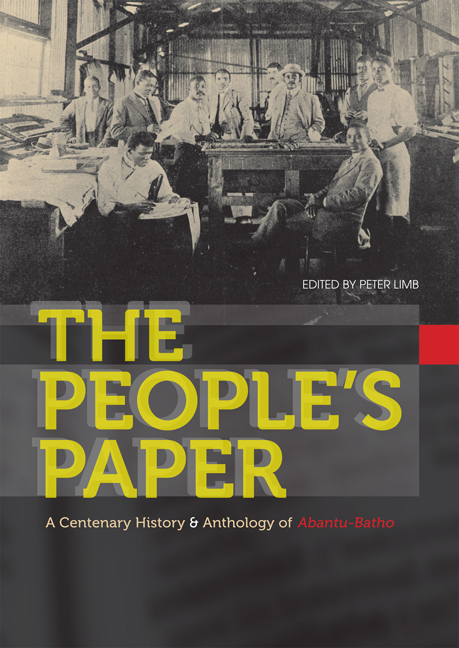Book contents
- Frontmatter
- Contents
- Contributors
- Acknowledgements
- Preface
- List of Abbreviations and Acronyms
- List of Illustrations
- PART I Essays
- Overview
- Introduction: A Centenary History of Abantu-Batho, the People's Paper
- Chapter 1 ‘Only the Bolder Spirits’: Politics, Racism, Solidarity and War in Abantu-Batho
- Chapter 2 ‘They Must Go to the Bantu Batho’: Economics and Education, Religion and Gender, Love and Leisure in the People's Paper
- FOUNDERS AND EDITORS
- THEMES AND CONNECTIONS
- PART II Anthology
Chapter 2 - ‘They Must Go to the Bantu Batho’: Economics and Education, Religion and Gender, Love and Leisure in the People's Paper
from Overview
Published online by Cambridge University Press: 21 April 2018
- Frontmatter
- Contents
- Contributors
- Acknowledgements
- Preface
- List of Abbreviations and Acronyms
- List of Illustrations
- PART I Essays
- Overview
- Introduction: A Centenary History of Abantu-Batho, the People's Paper
- Chapter 1 ‘Only the Bolder Spirits’: Politics, Racism, Solidarity and War in Abantu-Batho
- Chapter 2 ‘They Must Go to the Bantu Batho’: Economics and Education, Religion and Gender, Love and Leisure in the People's Paper
- FOUNDERS AND EDITORS
- THEMES AND CONNECTIONS
- PART II Anthology
Summary
In this, the second of a paired group of chapters on how Abantu-Batho reported the main news stories for Africans between 1912 and 1931, the focus is squarely on society and culture. I examine socio-economic and gender matters, and local cultural events such as concerts, church meetings and sports. In addressing the socio-cultural aspects of gender, class, education, leisure and religion, we peep behind the rhetoric of politics to see how society operated at a daily level. And yet, in such a committed newspaper, we still glimpse in its reports on social and cultural life the political and economic dimensions of this civil sphere, so glaring in a colonial and capitalist South Africa marked by such extremes of wealth and opportunity. For a discussion of how the paper refracted issues of politics, law, race and war, see the preceding chapter. Together, these two chapters paint a broad canvas of the newspaper and its people, form and content, and set the stage for the other chapters, which explore many of these aspects in finer detail.
LABOUR AND ECONOMICS
I have elaborated the labour reporting of Abantu-Batho elsewhere and I draw on that research in a summarised form here, but with new material added. Based in the industrial heartland, Abantu-Batho was best placed of the black press to cover the rising giant of the black working class. Given that Africans comprised the bulk of the labouring population and that migrant labour, pass laws and low wages adversely affected many families, it is not surprising that editors began to understand the significance of labour in the economy.
Davidson D. T. Jabavu of Fort Hare College is not often associated with Abantu- Batho. Yet, before the Chamber of Mines counter-attack against black radicalism after the 1920 miners’ strike, at the summit of the paper's prestige, there was nothing to scare him from submitting in his capacity as secretary of the Native Farmers’ Association (of the Cape) an article on farm labour. He exploded the myth of labour ‘shortages’ by showing they flowed from low wages and detailed farmer prejudice.
- Type
- Chapter
- Information
- The People’s PaperA Centenary History & Anthology of Abantu-Batho, pp. 81 - 115Publisher: Wits University PressPrint publication year: 2012



